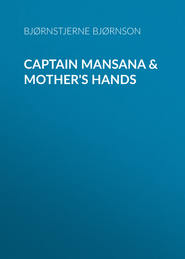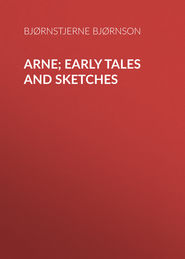По всем вопросам обращайтесь на: info@litportal.ru
(©) 2003-2024.
✖
Three Comedies
Автор
Год написания книги
2019
Настройки чтения
Размер шрифта
Высота строк
Поля
Leonarda. Yes.
Aagot. And I remember thinking and saying to you: That fellow Henri, in the play, was a stupid fellow. He had the choice between a strong-natured, handsome, spirited woman, who was ready to give her life for him, and a child who was really a stupid little thing—for she was, it is no use denying it, aunt—and he chose the insignificant little person. No, I would rather sit down here; I can rest better so. Ah, that is good! And now you mustn't look me in the face oftener than I want to let you, because you take it too dreadfully solemnly, and I am going to tell you something foolish now.—All of a sudden it flashed across my mind: Good heavens! the woman was—, and the little hussy with the curly hair was—, and he? But Hagbart is a man of some sense: he had chosen otherwise! And I did not know; but I realised at the same time that almost from the first day Hagbart used always to talk to you, and only to you, and hardly at all to me except to talk about you. I got so miserable about it that I felt as if some one had put a knife into my heart; and from that moment—I am so ashamed of it now—I had no more peace. I carried an aching pain in my heart night and day, and I thought my heart itself would break merely to see him speak to you or you to him. I am ashamed of myself; because what was more natural than that he should never be tired of talking to you? I never should, myself!
Leonarda. But still I don't see—I don't understand yet—
Aagot. Wait a bit! Oh, don't look so anxiously at me! It is all over now, you know.
Leonarda. What is all over?
Aagot. Bless my soul, wait! Aunt, dear, you are more impatient than I am myself! I do not want you to think me worse than I am, so I must first tell you how I fought with myself. I lay and cried all night, because I could not talk to you about it, and in the daytime I forced myself to seem merry and lively and happy. And then, aunt, one day I said to myself quite honestly: Why should you feel aggrieved at his loving her more than you? What are you, compared with her? And how splendid it would be, I thought, for my dear aunt to find some one she could truly love, and that it should be I that had brought them together!
Leonarda. That was splendid of you, Aagot!
Aagot. Yes, but now I mustn't make myself out better than I am, either. Because I did not always manage to look at it that way; very often something very like a sob kept rising in my throat. But then I used to talk to myself seriously, and say: Even supposing it is your own happiness you are giving up for her sake, is that too much for you to do for her? No, a thousand times no! And even supposing he does not love you any more, ought you not to be able to conquer your own feelings? Surely it would be cowardly not to be able to do that! Think no more of him, if he does not love you!
Leonarda. Aagot, I cannot tell you how I admire you, and love you, and how proud I am of you!
Aagot. Oh, aunt, I never realised as I did then what you have been to me! I knew that if I were capable of any great deed, anything really good or really fine, it was you that had planted the impulse in me. And then I sought every opportunity to bring this about; I wanted to take ever so humble a part in it, but without your hearing a word or a sigh from me. Besides, I had you always before me as an example; because I knew that you would have done it for me—indeed that you had already done as much. Your example was like a shining beacon to me, aunt!
Leonarda. Aagot!
Aagot. But you don't seem to be as happy about it as I am! Don't you understand yet how it all happened?
Leonarda. Yes, but—about the result of it?
Aagot. Dearest, you know all about that!—No, it is true, you don't! I must not forget to tell you that; otherwise you won't be able to understand why I behaved so stupidly at the Bishop's.
Leonarda. No.
Aagot. Well, you see, when I was full of this splendid determination to sacrifice myself so as to make you happy, I used to feel a regular fury come over me because Hagbart noticed no change in me—or, to be more correct, did not understand it in the least. He used to go about as if he were in a dream. Isn't it extraordinary how one thing leads to another? My feeling was stronger than I had any idea of; because when the Bishop wanted to slight you—and that was like a stab from behind, too!—I absolutely lost my head with Hagbart because of his not having prevented that, instead of going about dreaming. I don't know—but—well, you saw yourself what happened. I blurted out the first thing that came into my head and was abominably rude; you were angry; then we made friends again and I went away—and then, aunt—
Leonarda. And then—?
Aagot. Then I thought it all over! All the beautiful things you said to me about him, as we were going home, came back to me more and more forcibly. I saw you as I had always known you, noble and gentle.—It was so wonderful up there, too! The air, the clearness, the sense of space! And the lake, almost always calm, because it was so sheltered! And the wonderful stillness, especially in the evening!—And so it healed, just as a wound heals.
Leonarda. What healed?
Aagot. The pain in my heart, aunt. All the difficulties vanished. I know Hagbart to be what you said—noble and true. And you too, aunt! You would neither of you have wished to give me a moment's pain, even unconsciously, I knew. It was so good to realise that! It was so restful, that often while I was thinking of it, I went to sleep where I sat—I was so happy!—Ah, how I love him! And then came grandmother's letter—.
[HANS comes in, but does not see AAGOT at first.]
Hans. Then I am to fetch Miss Aagot—why, there she is!
Aagot (getting up). You quite frightened me, Hans!
Hans. Welcome back, miss!
Aagot. Thank you.
Hans. Well, you have saved me a journey, miss, I suppose?
Aagot. Yes. But someone must go and fetch my things.
Hans. Of course, miss.—But what is the matter with the mistress?
Aagot. Aunt!—Heavens, what is the matter?
Hans. The mistress has not looked well lately.
Aagot. Hasn't she? Aunt, dear! Shall I—? Would you like to—? Aunt!
Hans. Shall I fetch some one to—
Leonarda. No, no!—But you, Aagot—will you-. Oh, my God!—Will you run in—and get—
Aagot. Your bottle of drops?
Leonarda. Yes. (AAGOT runs out.) Hans, go as quickly as you can to the General's—ask him to come here! At once!
Hans. Yes, ma'am.
Leonarda. Hans!
Hans. Yes, ma'am.
Leonarda. Go on horseback. You may not find the General at home—and have to go elsewhere after him.
Hans. Yes, ma'am. (Goes out. AAGOT re-enters.)
Aagot. Here it is, aunt!
Leonarda. Thank you. It is over now.
Aagot. But what was it, aunt?
Leonarda. It was something, dear—something that comes over one sometimes at the change of the year.
[Curtain.]
(The interval between this act and the next should be very short.)
ACT IV
(SCENE.—A room in the BISHOP'S house, the same evening. The lights are lit. The BISHOP comes in with LEONARDA, who is in travelling dress, with a shawl over her arm and a bag in her hand. The BISHOP makes a movement as though to relieve her of them, but she puts them down herself.)
Leonarda. Your lordship must excuse me for troubling you so late as this; but the reason of it is something over which I have no control.–Is your nephew here?
Bishop. No, but I expect him. He has been here twice this afternoon already to see me, but I was out.
Aagot. And I remember thinking and saying to you: That fellow Henri, in the play, was a stupid fellow. He had the choice between a strong-natured, handsome, spirited woman, who was ready to give her life for him, and a child who was really a stupid little thing—for she was, it is no use denying it, aunt—and he chose the insignificant little person. No, I would rather sit down here; I can rest better so. Ah, that is good! And now you mustn't look me in the face oftener than I want to let you, because you take it too dreadfully solemnly, and I am going to tell you something foolish now.—All of a sudden it flashed across my mind: Good heavens! the woman was—, and the little hussy with the curly hair was—, and he? But Hagbart is a man of some sense: he had chosen otherwise! And I did not know; but I realised at the same time that almost from the first day Hagbart used always to talk to you, and only to you, and hardly at all to me except to talk about you. I got so miserable about it that I felt as if some one had put a knife into my heart; and from that moment—I am so ashamed of it now—I had no more peace. I carried an aching pain in my heart night and day, and I thought my heart itself would break merely to see him speak to you or you to him. I am ashamed of myself; because what was more natural than that he should never be tired of talking to you? I never should, myself!
Leonarda. But still I don't see—I don't understand yet—
Aagot. Wait a bit! Oh, don't look so anxiously at me! It is all over now, you know.
Leonarda. What is all over?
Aagot. Bless my soul, wait! Aunt, dear, you are more impatient than I am myself! I do not want you to think me worse than I am, so I must first tell you how I fought with myself. I lay and cried all night, because I could not talk to you about it, and in the daytime I forced myself to seem merry and lively and happy. And then, aunt, one day I said to myself quite honestly: Why should you feel aggrieved at his loving her more than you? What are you, compared with her? And how splendid it would be, I thought, for my dear aunt to find some one she could truly love, and that it should be I that had brought them together!
Leonarda. That was splendid of you, Aagot!
Aagot. Yes, but now I mustn't make myself out better than I am, either. Because I did not always manage to look at it that way; very often something very like a sob kept rising in my throat. But then I used to talk to myself seriously, and say: Even supposing it is your own happiness you are giving up for her sake, is that too much for you to do for her? No, a thousand times no! And even supposing he does not love you any more, ought you not to be able to conquer your own feelings? Surely it would be cowardly not to be able to do that! Think no more of him, if he does not love you!
Leonarda. Aagot, I cannot tell you how I admire you, and love you, and how proud I am of you!
Aagot. Oh, aunt, I never realised as I did then what you have been to me! I knew that if I were capable of any great deed, anything really good or really fine, it was you that had planted the impulse in me. And then I sought every opportunity to bring this about; I wanted to take ever so humble a part in it, but without your hearing a word or a sigh from me. Besides, I had you always before me as an example; because I knew that you would have done it for me—indeed that you had already done as much. Your example was like a shining beacon to me, aunt!
Leonarda. Aagot!
Aagot. But you don't seem to be as happy about it as I am! Don't you understand yet how it all happened?
Leonarda. Yes, but—about the result of it?
Aagot. Dearest, you know all about that!—No, it is true, you don't! I must not forget to tell you that; otherwise you won't be able to understand why I behaved so stupidly at the Bishop's.
Leonarda. No.
Aagot. Well, you see, when I was full of this splendid determination to sacrifice myself so as to make you happy, I used to feel a regular fury come over me because Hagbart noticed no change in me—or, to be more correct, did not understand it in the least. He used to go about as if he were in a dream. Isn't it extraordinary how one thing leads to another? My feeling was stronger than I had any idea of; because when the Bishop wanted to slight you—and that was like a stab from behind, too!—I absolutely lost my head with Hagbart because of his not having prevented that, instead of going about dreaming. I don't know—but—well, you saw yourself what happened. I blurted out the first thing that came into my head and was abominably rude; you were angry; then we made friends again and I went away—and then, aunt—
Leonarda. And then—?
Aagot. Then I thought it all over! All the beautiful things you said to me about him, as we were going home, came back to me more and more forcibly. I saw you as I had always known you, noble and gentle.—It was so wonderful up there, too! The air, the clearness, the sense of space! And the lake, almost always calm, because it was so sheltered! And the wonderful stillness, especially in the evening!—And so it healed, just as a wound heals.
Leonarda. What healed?
Aagot. The pain in my heart, aunt. All the difficulties vanished. I know Hagbart to be what you said—noble and true. And you too, aunt! You would neither of you have wished to give me a moment's pain, even unconsciously, I knew. It was so good to realise that! It was so restful, that often while I was thinking of it, I went to sleep where I sat—I was so happy!—Ah, how I love him! And then came grandmother's letter—.
[HANS comes in, but does not see AAGOT at first.]
Hans. Then I am to fetch Miss Aagot—why, there she is!
Aagot (getting up). You quite frightened me, Hans!
Hans. Welcome back, miss!
Aagot. Thank you.
Hans. Well, you have saved me a journey, miss, I suppose?
Aagot. Yes. But someone must go and fetch my things.
Hans. Of course, miss.—But what is the matter with the mistress?
Aagot. Aunt!—Heavens, what is the matter?
Hans. The mistress has not looked well lately.
Aagot. Hasn't she? Aunt, dear! Shall I—? Would you like to—? Aunt!
Hans. Shall I fetch some one to—
Leonarda. No, no!—But you, Aagot—will you-. Oh, my God!—Will you run in—and get—
Aagot. Your bottle of drops?
Leonarda. Yes. (AAGOT runs out.) Hans, go as quickly as you can to the General's—ask him to come here! At once!
Hans. Yes, ma'am.
Leonarda. Hans!
Hans. Yes, ma'am.
Leonarda. Go on horseback. You may not find the General at home—and have to go elsewhere after him.
Hans. Yes, ma'am. (Goes out. AAGOT re-enters.)
Aagot. Here it is, aunt!
Leonarda. Thank you. It is over now.
Aagot. But what was it, aunt?
Leonarda. It was something, dear—something that comes over one sometimes at the change of the year.
[Curtain.]
(The interval between this act and the next should be very short.)
ACT IV
(SCENE.—A room in the BISHOP'S house, the same evening. The lights are lit. The BISHOP comes in with LEONARDA, who is in travelling dress, with a shawl over her arm and a bag in her hand. The BISHOP makes a movement as though to relieve her of them, but she puts them down herself.)
Leonarda. Your lordship must excuse me for troubling you so late as this; but the reason of it is something over which I have no control.–Is your nephew here?
Bishop. No, but I expect him. He has been here twice this afternoon already to see me, but I was out.











